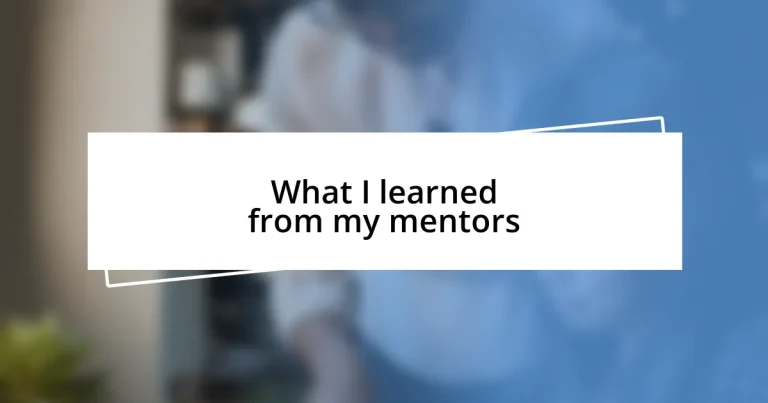Key takeaways:
- Mentorship provides unique perspectives, emotional support, and fosters accountability, driving personal and professional growth.
- Choosing the right mentor involves seeking shared values, relevant experience, and approachable personalities that foster a genuine connection.
- Building a supportive mentor relationship relies on trust, open communication, and embracing constructive feedback as a catalyst for growth.
- Sharing knowledge not only aids others’ development but also reinforces the mentor’s understanding and fosters a sense of community.
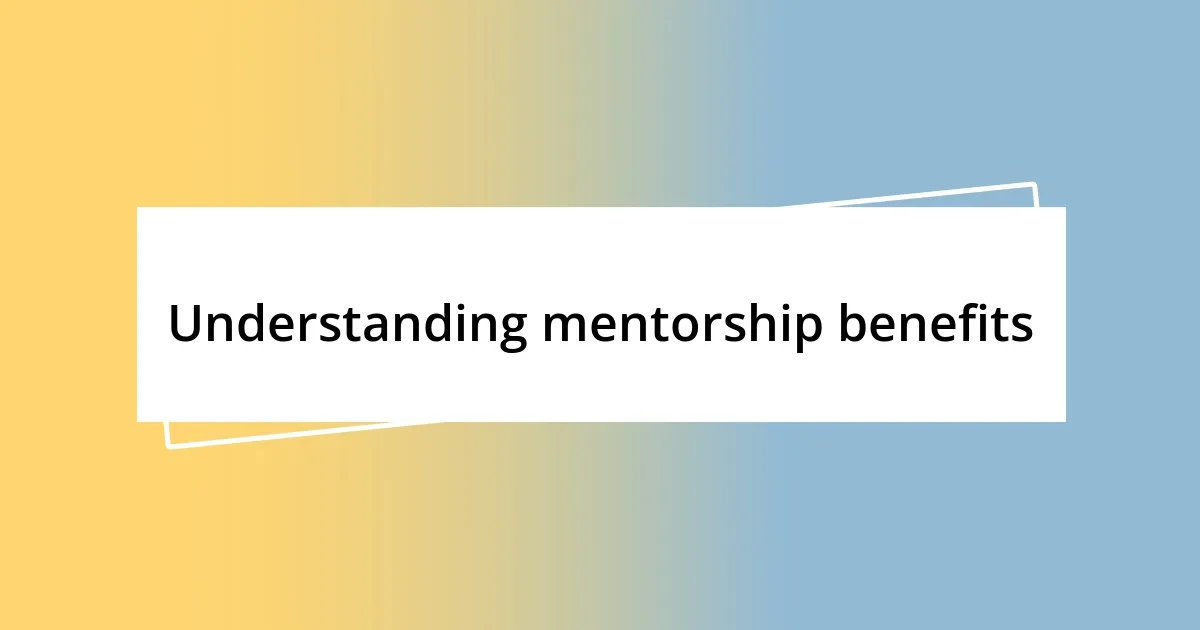
Understanding mentorship benefits
One of the most significant benefits of mentorship is the unique perspective it offers. I remember a time when a mentor pointed out blind spots in my thinking that I wasn’t aware of. Have you ever considered how a fresh set of eyes can ignite new ideas? It’s transformative.
Mentors also provide invaluable emotional support. There was a phase in my career when self-doubt crept in, and my mentor reminded me of my accomplishments and potential. It was a simple conversation, but it reignited my passion and confidence. Isn’t it amazing how the right words from someone who believes in you can shift your mindset?
Additionally, mentorship fosters accountability. I often reflect on how my mentor’s gentle nudges kept me on track, pushing me out of my comfort zone. Have you experienced that blend of encouragement and challenge? It’s this dynamic that propels growth and drives us towards achieving our goals.
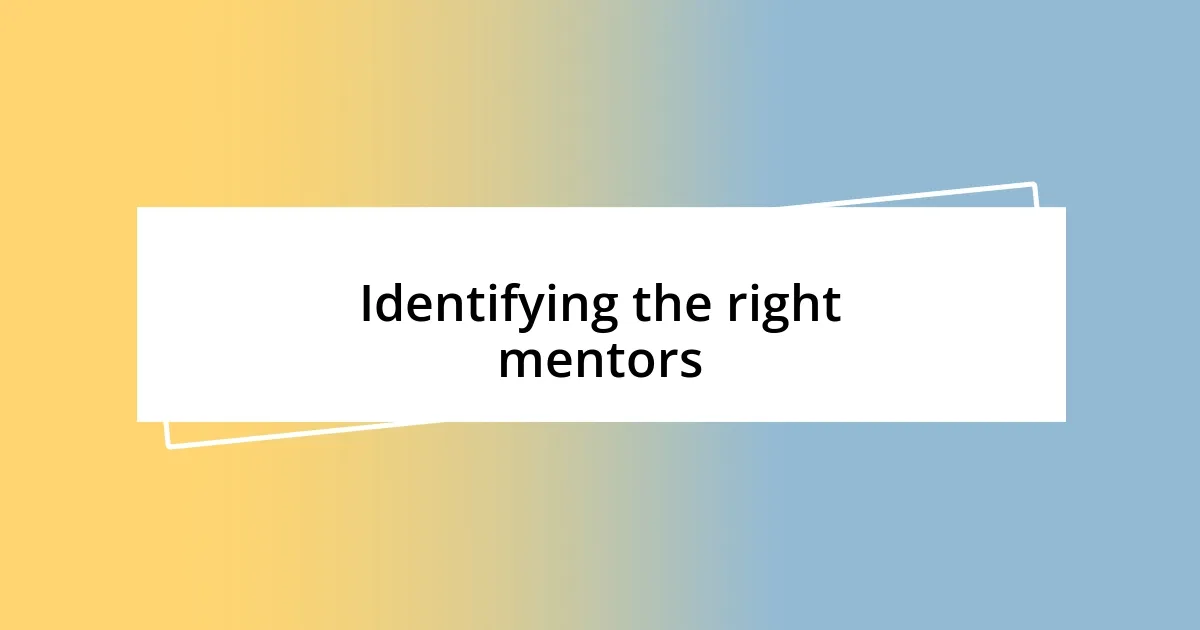
Identifying the right mentors
Identifying the right mentors can feel daunting, but it’s all about alignment and connection. Reflecting on my journey, I realized that the best mentors were those who not only had the experience I sought but also shared a similar value system. For instance, when I approached a seasoned professional in my field, I was drawn not just to their credentials but to their genuine passion for helping others grow. That emotional connection—knowing they cared about my development—made all the difference.
To find the right mentors, consider these key aspects:
- Shared Values: Look for mentors whose principles resonate with your own.
- Experience: Seek out those who have navigated paths you aspire to follow.
- Approachability: A mentor should be accessible and willing to invest time in you.
- Diverse Perspectives: Mentors with varied backgrounds can offer unique insights that challenge your thinking.
- Chemistry: Trust your instincts; if you feel a connection, that’s often a good sign.
I remember meeting a mentor at a networking event. We instantly clicked over our shared experiences, and that initial conversation laid the groundwork for a lasting relationship. They encouraged me to embrace my authentic self and not shy away from being unique in a sea of conformity. That insight—combined with my mentor’s ongoing support—has shaped my approach to challenges ever since.
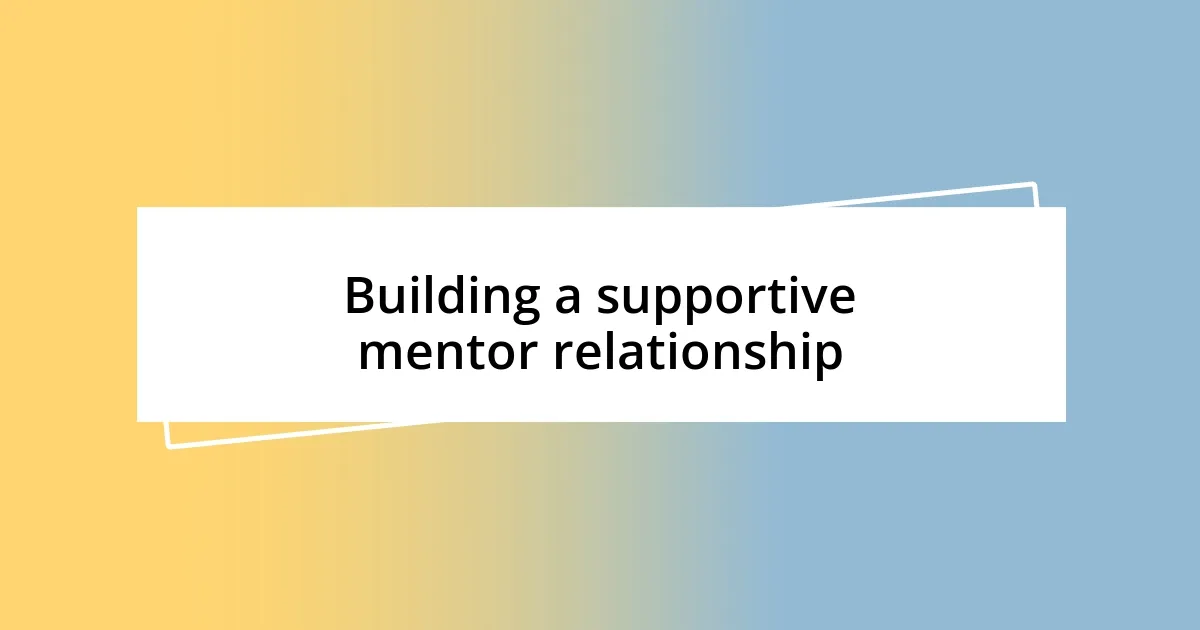
Building a supportive mentor relationship
Building a supportive mentor relationship is essential in any mentoring experience. From my perspective, establishing trust is the cornerstone of this bond. I recall a specific moment when I shared my deepest fears about my career trajectory with my mentor. Instead of brushing my concerns aside, they listened intently and offered constructive feedback. That feeling of being truly heard encouraged me to open up more, ultimately deepening our relationship. Have you felt the power of vulnerability in a mentor relationship?
Communication plays a vital role as well. I found that regular check-ins and honest dialogues made all the difference. There’s something about touching base often that fosters accountability, which I appreciate. One time, I set a challenging goal, and my mentor held me responsible while also celebrating my small victories along the way. It might seem subtle, but I think that balance of support and expectation is what truly fuels growth.
Lastly, embracing feedback is crucial. Mentorship isn’t just about receiving encouragement; it’s about learning through constructive criticism too. I had an experience where my mentor provided candid advice on a project I was deeply invested in. Though it stung a little at first, I realized their insights propelled my skills forward. It’s understanding that growth often comes from discomfort, and that’s a part of relationship-building that many overlook.
| Elements | Importance |
|---|---|
| Trust | Encourages open communication and vulnerability. |
| Communication | Fosters accountability and celebrates achievements. |
| Feedback | Drives personal and professional growth. |
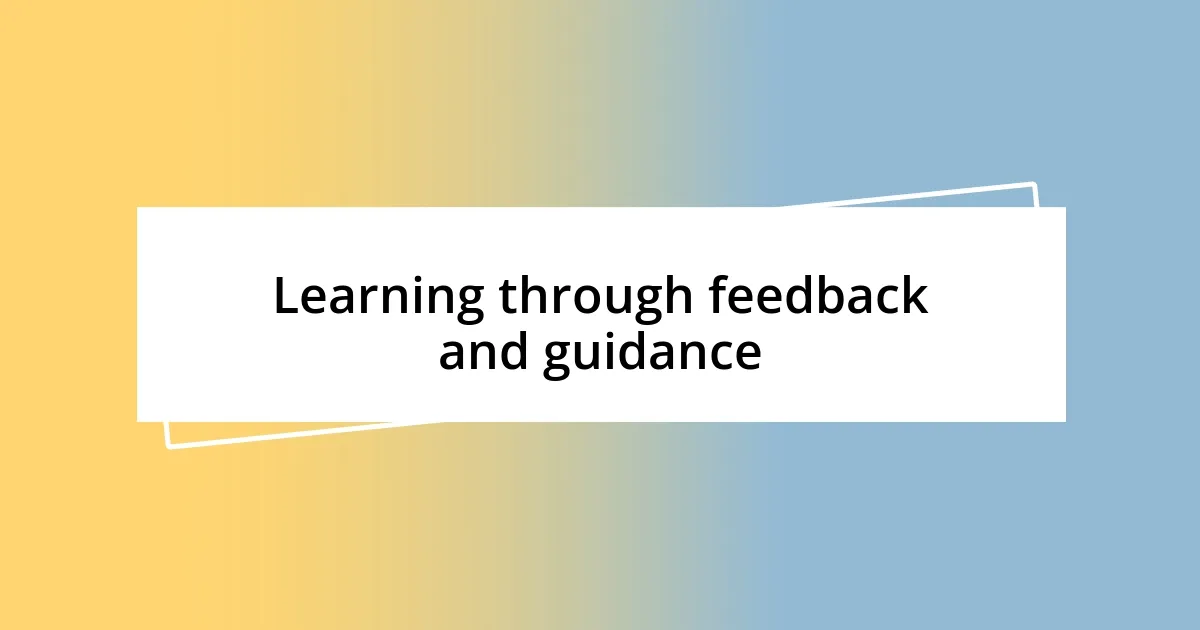
Learning through feedback and guidance
Learning through feedback and guidance has been a transformative experience for me. I vividly recall a time when a mentor pointed out a blind spot in my presentation skills. At first, it felt like a punch to the gut; however, that feedback turned out to be invaluable. It drove me to practice more intentionally and ultimately helped me convey my ideas with confidence. Have you ever received feedback that initially hurt but later shaped your success?
I’ve learned that guidance is most impactful when it’s anchored in honest conversations. There was a moment when my mentor opted to address an uncomfortable truth about a project I was passionate about. Instead of sugarcoating their thoughts, they shared their genuine concerns, which stirred a whirlwind of emotions within me. I realized that confronting these hard truths, although challenging, was essential for my growth and understanding of the bigger picture. Isn’t it fascinating how uncomfortable moments can leads us to enlightenment?
Moreover, mentorship has taught me to view feedback as a gift rather than a criticism. I remember struggling with a significant decision and reaching out to my mentor. Their advice, steeped in experience, included tough love, and it compelled me to reflect on my motivations. That kind of guidance was pivotal—it helped me realign my actions with my goals. How might your perspective shift if you started viewing every piece of feedback as a stepping stone to growth?
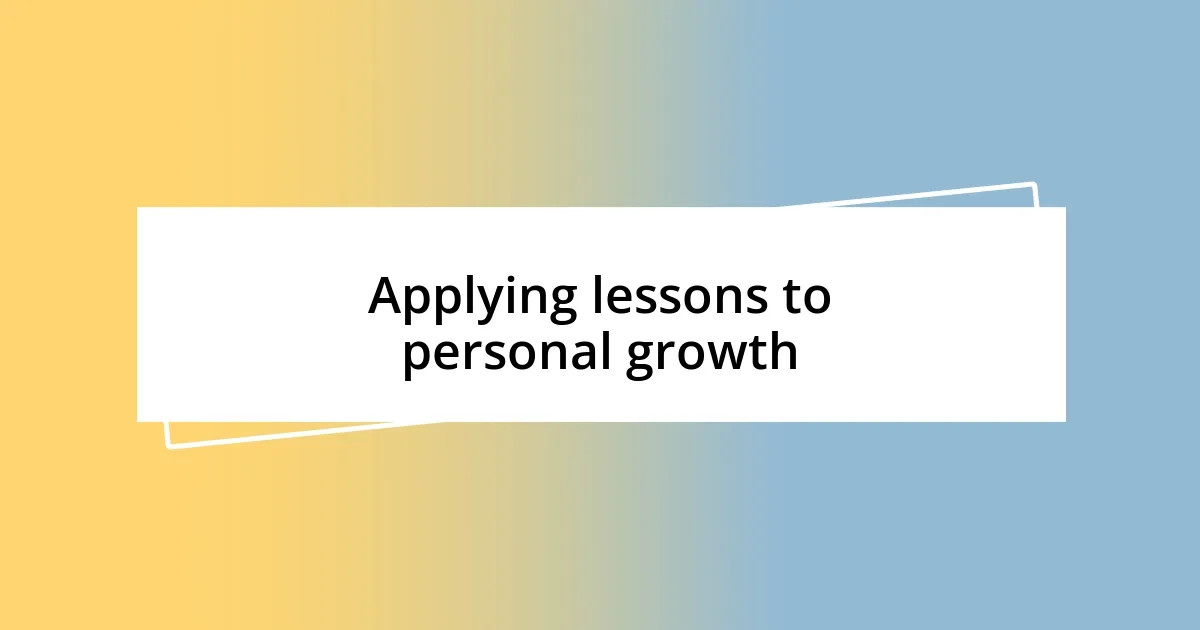
Applying lessons to personal growth
Applying what I’ve learned from my mentors has been a game-changer for my personal growth. For instance, I remember struggling with time management, often feeling overwhelmed by tasks. My mentor introduced me to the concept of prioritizing like a triage nurse would. The clarity that came from this approach transformed the way I tackled my workload. With every task sorted, I found that not only was I more productive, but I also felt less stressed. Have you ever felt that wave of relief when you finally gain control over your time?
Another profound lesson I incorporated into my life was the importance of self-reflection. After a mentorship session, I started journaling my thoughts and experiences regularly. This simple act allowed me to process my emotions more effectively. Once, I jotted down my feelings after receiving constructive feedback that initially upset me. When I revisited those notes later, I understood the feedback’s value and how it pushed me to improve. Isn’t it fascinating how reflecting on our experiences can illuminate the path we need to take?
Lastly, my mentors emphasized the significance of setting small, actionable goals to fuel sustainable growth. Early on, I used to aim for massive leaps, which often left me disheartened. A mentor encouraged me to break down tasks into bite-sized pieces. For example, instead of aiming to write an entire article in one sitting, I committed to a few paragraphs daily. This shift made the process much more enjoyable and achievable. Have you ever noticed how small wins can build momentum and inspire you to tackle bigger challenges? Each small success adds up, creating a powerful foundation for continued growth.
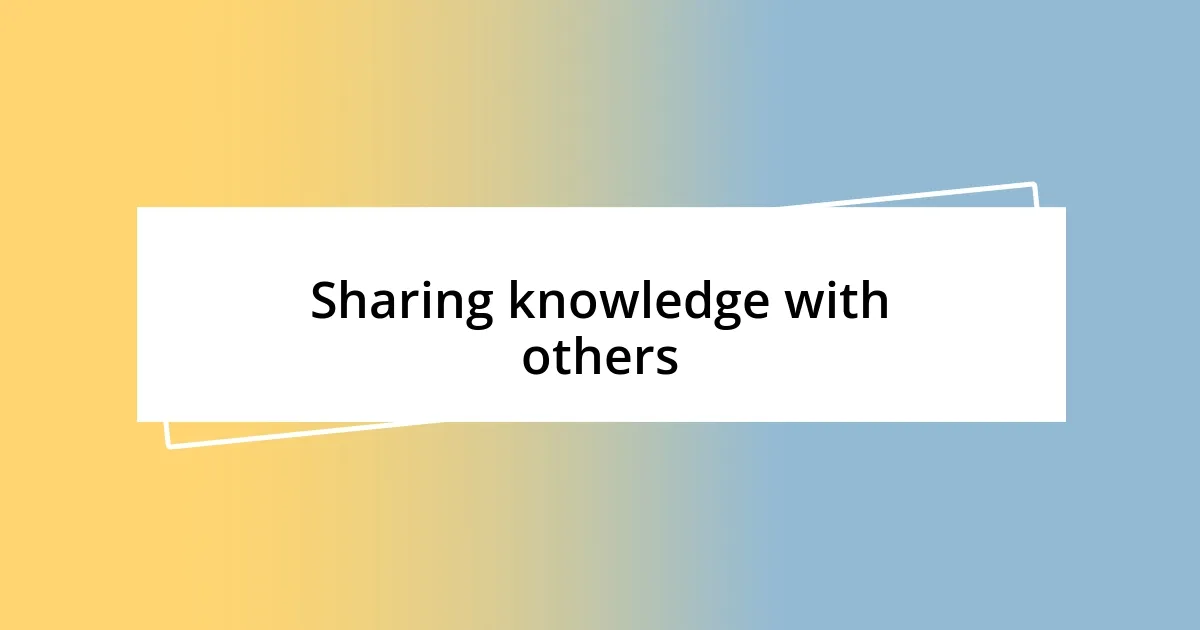
Sharing knowledge with others
Sharing knowledge with others has been one of the most rewarding aspects of my journey. I remember when I took on my first mentee; it felt like passing a torch. The joy of seeing someone else thrive, fueled by insights I had gained, was exhilarating. It made me realize that sharing knowledge isn’t just about transferring information; it’s about igniting potential in others. Have you ever felt that spark when you help someone grasp a difficult concept?
The act of teaching others has a way of solidifying my understanding too. Once, while explaining a complex project strategy to a group, I stumbled over terminology that I’d previously taken for granted. It forced me to rethink and simplify my language to ensure clarity. That experience opened my eyes to how sharing knowledge can deepen my own comprehension. Isn’t it ironic how teaching can often reveal the gaps in our own knowledge?
Moreover, I’ve discovered that sharing knowledge fosters a sense of community. When I engaged in group discussions with peers, everyone brought unique perspectives to the table. I fondly recall a workshop where we exchanged different approaches to problem-solving, each story adding layers to my understanding. Those moments reinforced how collaboration expands our viewpoints. Have you ever participated in a discussion that completely changed your perspective?
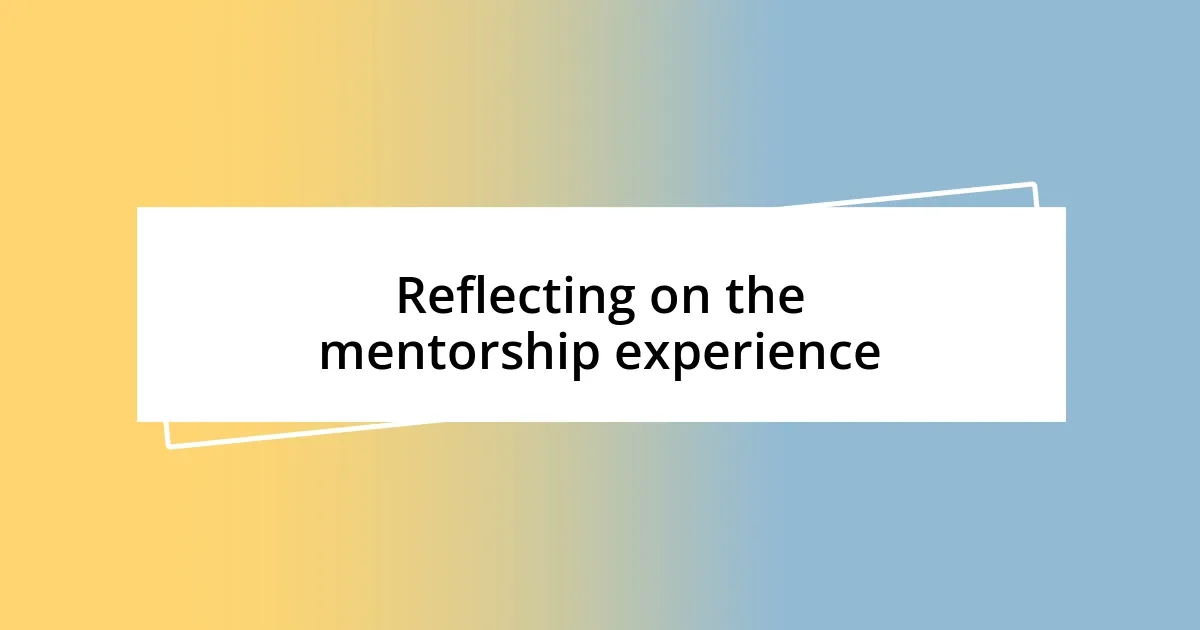
Reflecting on the mentorship experience
Reflecting on the mentorship experience can be incredibly eye-opening. I often think back to moments when my mentor challenged me to step outside of my comfort zone. One time, they pushed me to present my ideas to a larger audience. It scared me initially, but that experience taught me early on that vulnerability often leads to growth. Has fear ever held you back from seizing an opportunity?
Another pivotal realization I had during my mentorship was the value of constructive criticism. I remember a session where my mentor provided feedback on a project I thought was flawless. At first, I felt defensive, but as I listened, I recognized the potential for growth in their words. It made me appreciate that criticism isn’t a setback but a stepping stone toward improvement. Don’t you find it intriguing how sometimes our biggest breakthroughs come from discomfort?
I’ve also come to cherish the ongoing relationship I built with my mentors. It’s not just about learning skills; it’s about forging connections that last. I recall a heartfelt conversation with one mentor who shared their own struggles and triumphs. That moment humbly reminded me that everyone has a journey. Have you ever found comfort in realizing that others have navigated similar paths? These reflections solidified my understanding that mentorship is a two-way street, enriching both the mentor and mentee through shared experiences.












